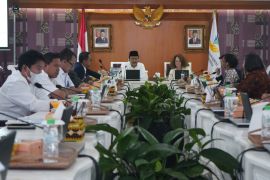"This law can support resilient economic recovery and long-term growth in Indonesia," according to an official statement from the World Bank received in Jakarta, Friday.
Economic recovery can be achieved through the Job Creation Law since the regulation eliminates major restrictions on investment, thereby indicating Indonesia’s openness for business.
This can indubitably help attract investors, create jobs, and help Indonesia in fighting poverty.
According to the World Bank, the Omnibus Law on Job Creation is a major reform endeavor to make Indonesia more competitive and support the country’s long-term aspirations of becoming a prosperous society.
However, the World Bank highlighted the criticality of consistency in implementing the law and strong implementing regulations to ensure inclusive and sustainable economic growth coupled with concentrated efforts by the Government of Indonesia and other stakeholders.
The World Bank remains resolute to working with the Government of Indonesia on these reforms in pursuit of economic recovery and a brighter future for all Indonesians.
President Joko Widodo had earlier emphasized the need for Indonesia to implement the job creation law in the wake of the COVID-19 pandemic to create jobs, encourage the opening of new businesses, and fight corruption.
“At the limited meeting (on Friday), I stressed why we need the job creation law,” the president remarked in a press statement issued from the Bogor Presidential Palace on the same day.
Widodo noted that the first rationale behind implementing the law is that 2.9 million new job seekers or youths enter the labor market annually, thereby necessitating the creation of new jobs.
The situation has been exacerbated by the COVID-19 pandemic, which has left 6.9 million people unemployed and 3.5 million workers affected, he noted.
The head of state pointed out that nearly 87 percent of Indonesian workers had studied up to senior high school or lower, while 39 percent had merely completed elementary schooling, thereby prompting the government to encourage the creation of job opportunities, especially in the labor-intensive sector.
“Hence, the job creation law is aimed at creating as many job opportunities as possible for job seekers and unemployed people,” he affirmed.
Widodo explained that the second objective behind the urgency to implement the law is that it will make it easier for the public, particularly micro- and small-scale entrepreneurs, to open new businesses.
The president stated that the new law was targeted at simplifying overlapping regulations and protracted procedures. He cited as an example that micro and small businesses will currently no longer need business permits but will only have to register with the relevant agency. Related news: Job creation law strikes balance between interests of parties: Kadin
Related news: House scheduled to send job creation law bill to President today
EDITED BY INE
Translator: Astrid F, Azis Kurmala
Editor: Suharto
Copyright © ANTARA 2020












